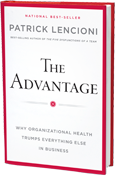 Few “business” authors write material that is as readily applicable in ministry settings as Patrick Lencioni. His newest book, The Advantage, is no exception. The subtitle captures the core message: Why Organizational Health Trumps Everything Else in Business. He could have omitted the last two words.
Lencioni’s focus on organizational health is right on target. A lack of health, more than any other factor, is what holds organizations back or causes them to stumble. The first of four disciplines in his model is to “build a cohesive leadership team” (based on the principles described in his book, The Five Dysfunctions of a Team). He argues that the most effective teams are built on trust, engage in conflict in healthy ways, have high levels of commitment, hold each other accountable, and are pursuing a shared goal. When this happens, the organization will soar.
The second discipline is to create clarity, which Lencioni says is done by answering six questions. I particularly appreciate his definition of a “core value,” which answers the question, “How do we behave?” The concept of values is not new – many authors have written about this and many organizations have created lists of their values. Lencioni’s contribution is to distinguish different types of values, and in doing so, to make a compelling case for the importance of establishing and adhering to a few core values.
If you’ve read any of Lencioni’s other books, let me offer two important caveats. First, The Advantage is not written as a fable. It is written in an easy-flowing, conversational style, but it doesn’t use a fictitious company to teach the principles. Second, The Advantage draws heavily from Lencioni’s other books. If you’ve read his other work (especially Five Dysfunctions and Silos. Politics and Turf Wars), then this one may seem repetitious.
There’s one other caution for readers, and it’s one that Lencioni mentions. Many of the ideas in The Advantage are quite simple, so much so that some readers may be tempted to dismiss them. Don’t make the mistake, however, of confusing “simple” with “easy to implement” or “too simplistic to do any good” or being something that is “beneath you.” In a recent presentation, Lencioni talked about one company that outperforms its competitors because they are willing to “stoop to greatness” by focusing on these simple practices. I would encourage you to get a copy of The Advantage, read it with your leadership team, and start “stooping” toward the simple but powerful disciplines that can build a healthy organization.
It’s easy to receive my blogs by email. Just sign-up on Feedburner by clicking here.]]>
Few “business” authors write material that is as readily applicable in ministry settings as Patrick Lencioni. His newest book, The Advantage, is no exception. The subtitle captures the core message: Why Organizational Health Trumps Everything Else in Business. He could have omitted the last two words.
Lencioni’s focus on organizational health is right on target. A lack of health, more than any other factor, is what holds organizations back or causes them to stumble. The first of four disciplines in his model is to “build a cohesive leadership team” (based on the principles described in his book, The Five Dysfunctions of a Team). He argues that the most effective teams are built on trust, engage in conflict in healthy ways, have high levels of commitment, hold each other accountable, and are pursuing a shared goal. When this happens, the organization will soar.
The second discipline is to create clarity, which Lencioni says is done by answering six questions. I particularly appreciate his definition of a “core value,” which answers the question, “How do we behave?” The concept of values is not new – many authors have written about this and many organizations have created lists of their values. Lencioni’s contribution is to distinguish different types of values, and in doing so, to make a compelling case for the importance of establishing and adhering to a few core values.
If you’ve read any of Lencioni’s other books, let me offer two important caveats. First, The Advantage is not written as a fable. It is written in an easy-flowing, conversational style, but it doesn’t use a fictitious company to teach the principles. Second, The Advantage draws heavily from Lencioni’s other books. If you’ve read his other work (especially Five Dysfunctions and Silos. Politics and Turf Wars), then this one may seem repetitious.
There’s one other caution for readers, and it’s one that Lencioni mentions. Many of the ideas in The Advantage are quite simple, so much so that some readers may be tempted to dismiss them. Don’t make the mistake, however, of confusing “simple” with “easy to implement” or “too simplistic to do any good” or being something that is “beneath you.” In a recent presentation, Lencioni talked about one company that outperforms its competitors because they are willing to “stoop to greatness” by focusing on these simple practices. I would encourage you to get a copy of The Advantage, read it with your leadership team, and start “stooping” toward the simple but powerful disciplines that can build a healthy organization.
It’s easy to receive my blogs by email. Just sign-up on Feedburner by clicking here.]]>



